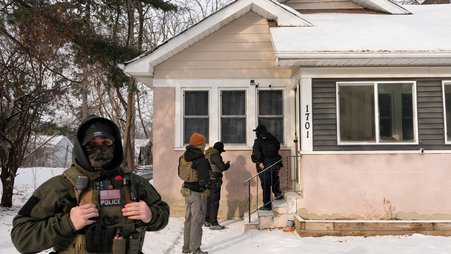Major media publishers are refusing to publish leaked U.S. intelligence documents about Israel’s plans to strike Iran. They’ll report on them as they see fit, but they won’t let us see the source material. Some outlets are framing it as if they’re taking some kind of courageous stand by withholding newsworthy records from the public.
But why? How did mainstream news outlets go from publishing the Pentagon Papers to helping the national security state clean up its messes during a brutal war?
Here’s my theory: The decision to self-censor has more to do with fear of legal repercussions than journalistic ethics. The media was forced into risk aversion by the prosecution of WikiLeaks founder Julian Assange for publishing government secrets, which ended in a guilty plea earlier this year. Now it’s repackaging timidity as integrity.
It’s not the first time media publishers’ business decisions have somehow morphed into canons of journalistic ethics. It wasn’t until an appellate court opened the door to liability for undercover investigations that the media turned its back on that long-standing practice. Now, the journalistic establishment wags its collective finger at filmmakers who expose Supreme Court justices as right-wing ideologues.
Even the concept of objectivity — the core tenet to which journalism students are taught to aspire — started as a marketing idea: news wire services needed to put out a product that clients from Alabama to New York would find palatable. Mass media outlets that wanted to appeal to a similarly broad audience followed suit.
But this newest journalistic norm might be the most troubling yet. News outlets don’t work for the government and should not put its interests over those of their readers.
The media actually called its own bluff in advance. Just weeks ago, opposition research documents on Republican vice presidential nominee JD Vance leaked. Iranian hackers were allegedly behind it.
Mainstream outlets refused to publish those documents too — but they claimed it was primarily because the documents weren’t newsworthy, not because of some hard and fast rule against publishing leaks from foreign adversaries. (One journalist who did publish the leaks, Ken Klippenstein, received a visit from the FBI).
The Iran-Israel leak, on the other hand, was indisputably newsworthy, and to date, no one has any idea whether the documents came from an adversary, a U.S. insider, or one of the other “Five Eyes” nations. And there’s no indication that the documents put U.S. troops in danger (if they thwarted or stalled a large-scale Israeli attack they may well have kept them out of danger).
Yet, the same outlets came to the same conclusion: don’t publish. The only explanation left is that media outlets are jumping at the chance to show the government that theirs are among the well-behaved journalists, not the troublemakers like Assange and WikiLeaks.
Earlier this year, the U.S. government, seeking to extradite Assange, argued in a U.K. court that traditional journalists need not worry about the precedent a prosecution would set: They don’t just dump documents on the internet like WikiLeaks; they edit, redact, and make careful decisions about what to publish and not to publish.
Implicit in that argument is that if news outlets were to print leaks in their entirety (i.e., if they pulled that Pentagon Papers stunt again), they’d be in the same boat as Assange. Maybe it’s a coincidence that the media is doing exactly what government lawyers just argued responsible journalists should do in these situations. But I doubt it.
After all, the government believes it’s entirely up to its whims when national security reporters can be jailed. The Espionage Act, under which Assange was prosecuted, makes no distinction between “good” journalists who publish selectively and “bad” ones who do the opposite.
The archaic law makes it a crime to obtain or publish national defense information under any circumstances. (Convicting a journalist for reporting the news would violate the First Amendment, assuming the current judiciary would uphold precedents set decades ago, but that’s no sure thing, and it’d be rather expensive to find out). In the Assange case, the government told journalists, who may technically violate the Espionage Act regularly, what they need to do if they want prosecutors to look the other way. It’s hard to imagine a more effective way, short of authoritarian tactics, to coerce journalists to tread cautiously.
There may be times when editors have other reasons to hold back details, like names and troop positions. But that’s motivated by keeping individuals safe, not avoiding undermining foreign war efforts. There may also be times where outlets withhold documents to protect sources, but the Iran-Israel records had already been posted on a popular Telegram channel.
In the aftermath of the Assange case, there seems to be a reflexive impulse against publishing leaked documents involving foreign adversaries, regardless of their newsworthiness and sensitivity. The government shouldn’t be able to dictate how reporters and editors do their jobs. But, due to the Espionage Act’s ambiguity, it can, and the media’s trepidation about publishing the Iran-Israel leaks shows that it’s working.
It’s past time to reform the Espionage Act. But it’s also time for the media to be transparent about what really motivates these decisions. Maybe the latter would lead to the former by showing Americans the extent to which the Espionage Act constrains all journalists, not just Julian Assange.





